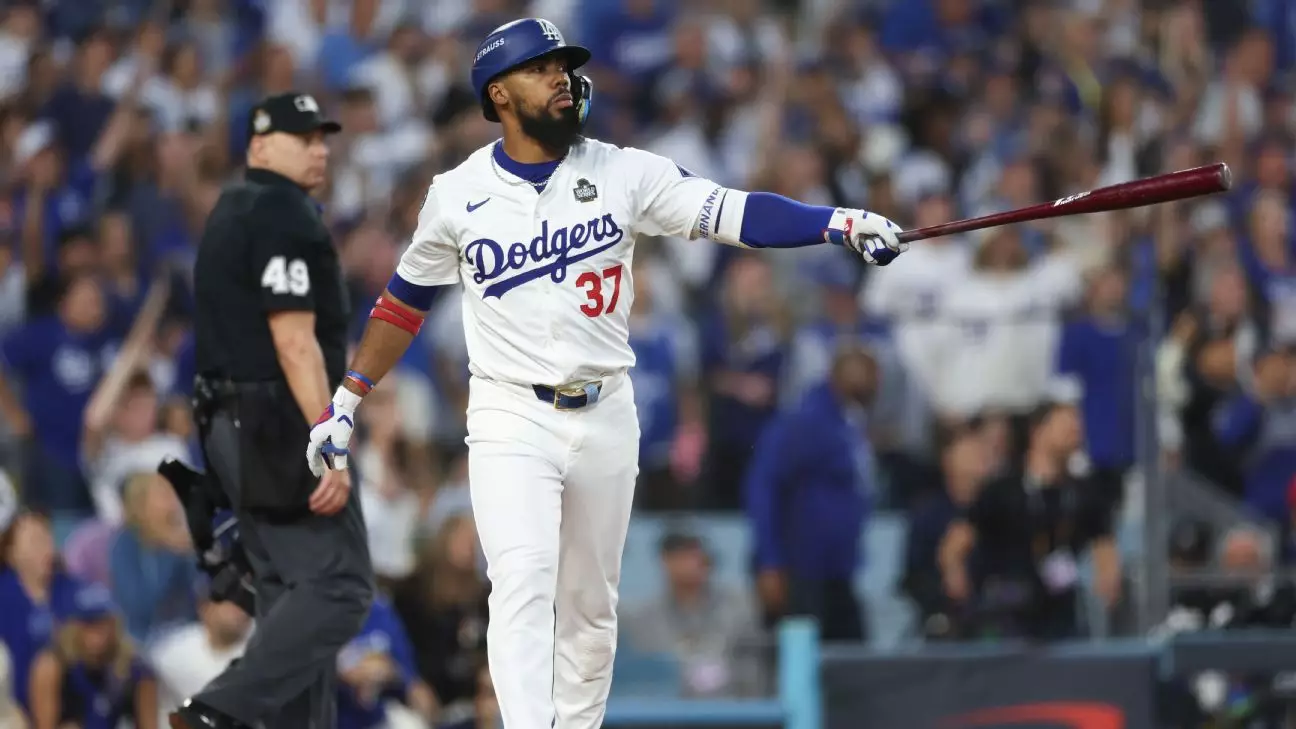The Los Angeles Dodgers have made headlines with the recent signing of outfielder Teoscar Hernández to a three-year, $66 million contract. This move reunites Hernández with a franchise that he previously helped lead to a World Series title, bringing back a player who has demonstrated his capability to perform in high-pressure environments. While the deal may appear straightforward at first glance, a deeper look reveals the underlying strategies and implications this signing brings to both Hernández’s career and the Dodgers‘ roster dynamics.
Teoscar Hernández’s return to the Dodgers, where he won a championship, shows a mutual desire from both sides to capitalize on a successful past. Hernández’s Instagram declaration of „I’m Back“ signifies not only his enthusiasm but also the optimism that fans and management alike hold regarding his impact on the team. After one year on a $23.5 million contract, which included deferred payments and was perceived as undervalued by free agency standards, Hernández’s performance warranted this extended commitment from the Dodgers.
His stellar statistics during his previous season, highlighted by a .272 batting average, 33 home runs, and 99 RBIs, reinforce the Dodgers‘ decision to invest heavily in him. More than just numbers, his crucial plays in the postseason, particularly a two-run double in the Game 5 clincher, showcased his capability to deliver when it matters most. This mix of past success and strong statistical backing undoubtedly shaped the Dodgers‘ willingness to offer him a long-term contract.
The intricacies of Hernández’s new contract are noteworthy. With a club option for 2028 valued at $15 million and a $6.5 million buyout, along with deferred payments amounting to $23.5 million, the financial strategies employed by the Dodgers deserve attention. This approach not only provides flexibility to the franchise’s overall payroll but also impacts the cash flow and tax implications for Hernández, particularly in a high-tax state like California.
Deferred money in contracts is prevalent in modern baseball and serves as a tactical maneuver for teams to manage their budget. The Dodgers‘ decision to structure Hernández’s deal with deferrals echoes their broader strategy of balancing immediate financial outlay with long-term commitments. In a landscape where teams are grappling with the financial repercussions of player contracts, the Dodgers have chosen a path that aims to spread financial responsibilities over several years, creating room for more roster adjustments in the interim.
Los Angeles‘ offseason strategy illustrates a commitment to maintaining a competitive edge in the National League. The addition of not just Hernández but also other impactful players like two-time Cy Young winner Blake Snell signifies that the Dodgers are building a formidable roster. Their approach reflects a clear intention to stay ahead in a league where every small advantage can translate into postseason success.
Hernández joins a crowded outfield that features established players like Michael Conforto, Mookie Betts, and Chris Taylor. The competition for playing time will be fierce, but Hernández enhances the overall quality of the lineup. His ability to hit homers and drive in runs positions him as a significant asset, blending well with players who can also contribute offensively.
As one examines the contracts of Hernández and other high-profile players like Shohei Ohtani, it becomes clear that tax implications play a significant role in contract negotiations. During a time when player salaries have skyrocketed, teams and players are increasingly exploring financial loopholes and strategies to mitigate tax burdens. Hernández’s deal, with its deferred payments, is emblematic of this trend. Such arrangements allow players to spread their taxable income over several years, ultimately impacting their net earnings favorably.
Furthermore, legislative changes concerning these financial matters — particularly in California — could influence future negotiations not just for Hernández, but for other players as well. The dynamic nature of contracts in Major League Baseball must now navigate the complexities of taxation alongside performance-related discussions, further complicating a player’s decision-making process.
Teoscar Hernández’s return to the Dodgers underpins not just a reunion of talent and opportunity, but also showcases the strategic financial and operational frameworks embedded in modern baseball. As both a skilled athlete and a savvy negotiator, Hernández embodies the duality of sport and business in the contemporary landscape of Major League Baseball. This contract will have lasting implications for the franchise’s ambitions and for Hernández’s career trajectory as they aim for another championship title.


Napsat komentář